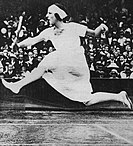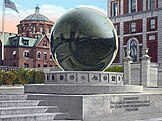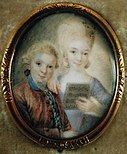Wikipedia:Main Page history/2022 July 9
From today's featured article
Suzanne Lenglen (1899–1938) was a French tennis player. One of the sport's biggest stars and the dominant women's tennis player right after World War I, Lenglen was the inaugural world No. 1 and a six-time Wimbledon singles champion. After the war, she only had one singles loss and was undefeated in doubles with Elizabeth Ryan. Her popularity stemmed from her becoming a world champion at age 15, her unusual balletic playing style, her brash personality, and prominent press coverage that portrayed her as infallible at tennis. Lenglen had a wide impact on the sport. She was the first leading amateur to turn professional and her 1926 pro tour in the United States laid the foundation for the next four decades of men's pro tennis. She incorporated fashion into the game and popularised sportswear to supplant the norm of women competing in corsets. Wimbledon moved to its current venue to accommodate her popularity. Court Suzanne Lenglen at the French Open is named in her honour. (Full article...)
Did you know ...
- ... that despite having reportedly been destroyed in 1946, the 16-ton granite ball that once sat on top of the Columbia University sundial (pictured) reappeared in a Michigan field in 2001?
- ... that J. Michael Miller, the archbishop of Vancouver, who turns 76 today, starred in a high school production of Our Town opposite Mary Lou Finlay?
- ... that a Louisiana radio station went to a satellite-fed music format because it had more control than with its previous "18- and 20-year-old jocks"?
- ... that Avtar Singh Jouhl took Malcolm X to a segregated pub in Smethwick as part of his campaign to end the colour bar?
- ... that the title of the incel and Frogtwitter subculture film TFW No GF stands for "that feeling when [you have] no girlfriend"?
- ... that 2021 NCAA champion Bonnie Tan served as the assistant to 2021 UAAP champion Goldwin Monteverde in 1991?
- ... that the developer of 15.ai claims that as little as 15 seconds of a person's voice is sufficient to clone it up to human standards using artificial intelligence?
- ... that Alfons Koziełł-Poklewski, dubbed the "vodka king of Siberia", was actually Polish?
In the news
- Former Japanese prime minister Shinzo Abe (pictured) is assassinated while giving a speech in Nara.
- Boris Johnson announces his intention to resign as Prime Minister of the United Kingdom.
- The Fields Medal for accomplishments in mathematics is awarded to Hugo Duminil-Copin, June Huh, James Maynard and Maryna Viazovska.
- Uzbekistan declares a state of emergency after protests in the autonomous region of Karakalpakstan.
On this day
July 9: First day of Eid al-Adha (Islam, 2022)
- 1763 – The Mozart family grand tour began, presenting child prodigies Maria Anna and Wolfgang (both pictured) in Western Europe.
- 1877 – The inaugural Wimbledon Championship, the world's oldest tennis tournament, began in London.
- 1896 – Politician William Jennings Bryan made his Cross of Gold speech advocating bimetallism, considered one of the greatest political speeches in American history.
- 1937 – Nitrate film being stored in a 20th Century Fox facility spontaneously combusted, destroying more than 40,000 reels of negatives and film prints.
- 1962 – In a seminal moment for pop art, Andy Warhol's Campbell's Soup Cans exhibition opened at the Ferus Gallery in Los Angeles.
- Ariwara no Narihira (d. 880)
- Elizabeth of Austria (b. 1526)
- John Archibald Wheeler (b. 1911)
Today's featured picture

|
Haboku sansui (破墨山水図, Broken Ink Landscape) is a splashed-ink landscape painting on a hanging scroll. It was made by the Japanese artist Sesshū Tōyō in 1495, in the Muromachi period. Sesshū Tōyō was a Zen Buddhist monk and painter. The work is a development of suibokuga paintings made with Chinese ink, using dark and light shades on a silk or paper medium. The monochromatic style can result in artworks similar to calligraphy. In spite of its title, the work is not one of "broken ink" (haboku) but rather one of "splashed ink" (hatsuboku). In this style, the painter avoids strongly defined outlines, with shapes indicated by colour washes in lighter and darker tones. Credit: Sesshū Tōyō; photographed by Bamse
Recently featured:
|
Other areas of Wikipedia
- Community portal – The central hub for editors, with resources, links, tasks, and announcements.
- Village pump – Forum for discussions about Wikipedia itself, including policies and technical issues.
- Site news – Sources of news about Wikipedia and the broader Wikimedia movement.
- Teahouse – Ask basic questions about using or editing Wikipedia.
- Help desk – Ask questions about using or editing Wikipedia.
- Reference desk – Ask research questions about encyclopedic topics.
- Content portals – A unique way to navigate the encyclopedia.
Wikipedia's sister projects
Wikipedia is written by volunteer editors and hosted by the Wikimedia Foundation, a non-profit organization that also hosts a range of other volunteer projects:
-
Commons
Free media repository -
MediaWiki
Wiki software development -
Meta-Wiki
Wikimedia project coordination -
Wikibooks
Free textbooks and manuals -
Wikidata
Free knowledge base -
Wikinews
Free-content news -
Wikiquote
Collection of quotations -
Wikisource
Free-content library -
Wikispecies
Directory of species -
Wikiversity
Free learning tools -
Wikivoyage
Free travel guide -
Wiktionary
Dictionary and thesaurus
Wikipedia languages
This Wikipedia is written in English. Many other Wikipedias are available; some of the largest are listed below.
-
1,000,000+ articles
-
250,000+ articles
-
50,000+ articles




